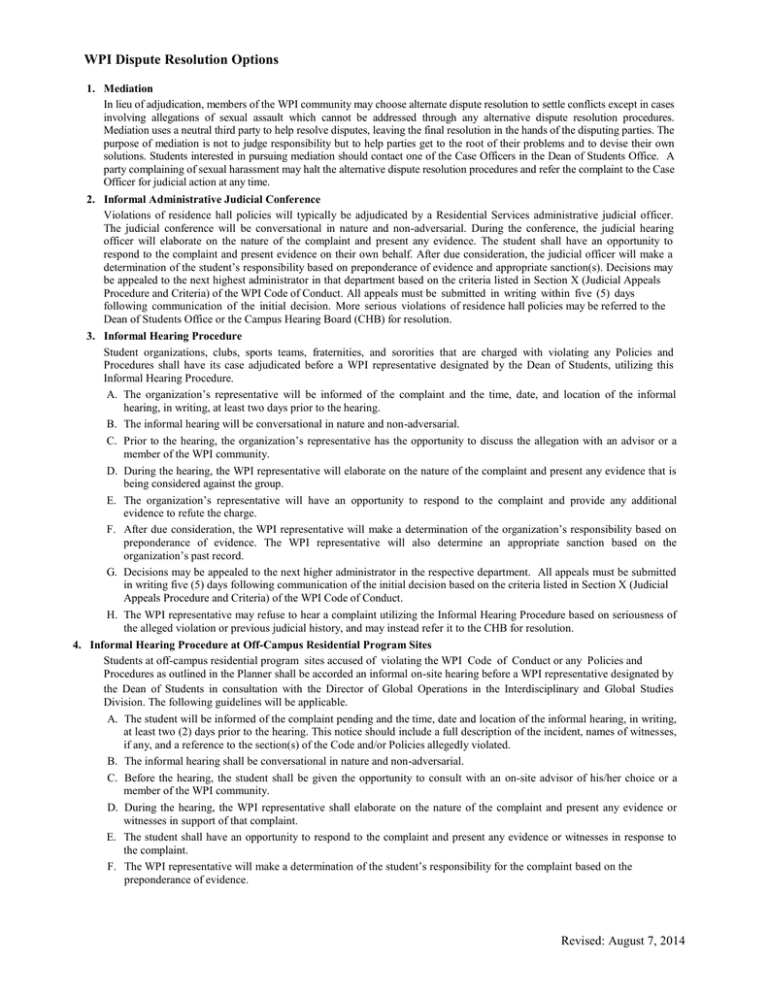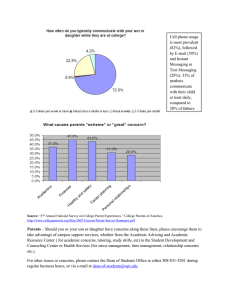
WPI Dispute Resolution Options
1. Mediation
In lieu of adjudication, members of the WPI community may choose alternate dispute resolution to settle conflicts except in cases
involving allegations of sexual assault which cannot be addressed through any alternative dispute resolution procedures.
Mediation uses a neutral third party to help resolve disputes, leaving the final resolution in the hands of the disputing parties. The
purpose of mediation is not to judge responsibility but to help parties get to the root of their problems and to devise their own
solutions. Students interested in pursuing mediation should contact one of the Case Officers in the Dean of Students Office. A
party complaining of sexual harassment may halt the alternative dispute resolution procedures and refer the complaint to the Case
Officer for judicial action at any time.
2. Informal Administrative Judicial Conference
Violations of residence hall policies will typically be adjudicated by a Residential Services administrative judicial officer.
The judicial conference will be conversational in nature and non-adversarial. During the conference, the judicial hearing
officer will elaborate on the nature of the complaint and present any evidence. The student shall have an opportunity to
respond to the complaint and present evidence on their own behalf. After due consideration, the judicial officer will make a
determination of the student’s responsibility based on preponderance of evidence and appropriate sanction(s). Decisions may
be appealed to the next highest administrator in that department based on the criteria listed in Section X (Judicial Appeals
Procedure and Criteria) of the WPI Code of Conduct. All appeals must be submitted in writing within five (5) days
following communication of the initial decision. More serious violations of residence hall policies may be referred to the
Dean of Students Office or the Campus Hearing Board (CHB) for resolution.
3. Informal Hearing Procedure
Student organizations, clubs, sports teams, fraternities, and sororities that are charged with violating any Policies and
Procedures shall have its case adjudicated before a WPI representative designated by the Dean of Students, utilizing this
Informal Hearing Procedure.
A. The organization’s representative will be informed of the complaint and the time, date, and location of the informal
hearing, in writing, at least two days prior to the hearing.
B. The informal hearing will be conversational in nature and non-adversarial.
C. Prior to the hearing, the organization’s representative has the opportunity to discuss the allegation with an advisor or a
member of the WPI community.
D. During the hearing, the WPI representative will elaborate on the nature of the complaint and present any evidence that is
being considered against the group.
E. The organization’s representative will have an opportunity to respond to the complaint and provide any additional
evidence to refute the charge.
F. After due consideration, the WPI representative will make a determination of the organization’s responsibility based on
preponderance of evidence. The WPI representative will also determine an appropriate sanction based on the
organization’s past record.
G. Decisions may be appealed to the next higher administrator in the respective department. All appeals must be submitted
in writing five (5) days following communication of the initial decision based on the criteria listed in Section X (Judicial
Appeals Procedure and Criteria) of the WPI Code of Conduct.
H. The WPI representative may refuse to hear a complaint utilizing the Informal Hearing Procedure based on seriousness of
the alleged violation or previous judicial history, and may instead refer it to the CHB for resolution.
4. Informal Hearing Procedure at Off-Campus Residential Program Sites
Students at off-campus residential program sites accused of violating the WPI Code of Conduct or any Policies and
Procedures as outlined in the Planner shall be accorded an informal on-site hearing before a WPI representative designated by
the Dean of Students in consultation with the Director of Global Operations in the Interdisciplinary and Global Studies
Division. The following guidelines will be applicable.
A. The student will be informed of the complaint pending and the time, date and location of the informal hearing, in writing,
at least two (2) days prior to the hearing. This notice should include a full description of the incident, names of witnesses,
if any, and a reference to the section(s) of the Code and/or Policies allegedly violated.
B. The informal hearing shall be conversational in nature and non-adversarial.
C. Before the hearing, the student shall be given the opportunity to consult with an on-site advisor of his/her choice or a
member of the WPI community.
D. During the hearing, the WPI representative shall elaborate on the nature of the complaint and present any evidence or
witnesses in support of that complaint.
E. The student shall have an opportunity to respond to the complaint and present any evidence or witnesses in response to
the complaint.
F. The WPI representative will make a determination of the student’s responsibility for the complaint based on the
preponderance of evidence.
Revised: August 7, 2014
G. If the student is found responsible, the WPI representative must contact the Dean of Students or designee to review the
student’s past record, if any, before a sanction is determined. The WPI representative must then consult with the Dean of
Students Office and the Director of Global Operations in the Interdisciplinary and Global Studies Division to determine
an appropriate sanction for the offense.
H. All decisions shall be final and not subject to appeal on site. The decision may be appealed to the Presidential Appeals
Board once the student has returned to the WPI campus. Appeals may be submitted in writing to the Presidential Appeals
Board within five (5) days of the start of classes of the term following the off campus project experience. The appeal must
be specific and contain a full description of the basis for the appeal. Grounds for an appeal must be based on one or more
of the following criteria:
a. Failure to follow the procedures outlined in the Student Planner and Resource Guide;
b. Inappropriate gravity of the sanction in relationship to the offense;
c. That no reasonable judicial officer could conclude, on the basis of the evidence presented, that a proper decision
was rendered.
The appeal will not be reviewed until after the start of the term following the off-campus project experience when all
parties involved have returned to the WPI campus.
I. If the on-site WPI representative, in consultation with the Dean of Students and Director of Global Operations, determines
that continued presence at the project center by the student would constitute a danger to the safety of persons or property
on the premises of the project center, a recommendation for interim suspension may be made to the Chief Student Affairs
Officer or designee.
Administrative Agreement Decisions at Off-Campus Program Sites:
Students at off-campus residential program sites who accept responsibility for the complaint against them may choose, with the
agreement of the University and/or complainant, to waive their right to the informal hearing procedure and instead accept a
sanction imposed by the University. The WPI representative must communicate with the Dean of Students and the Director of
Global Operations before taking action.
Note: WPI’s Academic Honesty Policy and the procedures described therein also apply to the off-campus residential programs.
5. Administrative Agreement
Members of the WPI community who accept responsibility for the complaint against them may choose, with the agreement of
the University and/or complainant, to waive their right to a hearing before the CHB and instead accept a sanction imposed by
the Case Officer.
6. The Campus Hearing Board (CHB) is the most formal judicial body at WPI, and has jurisdiction over cases involving alleged
violations of the Code of Conduct. – Please see additional information about the CHB in the Student Planner and Resource
Guide.
Revised: August 7, 2014

